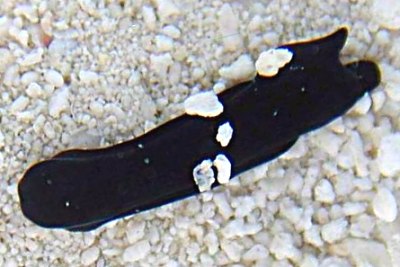
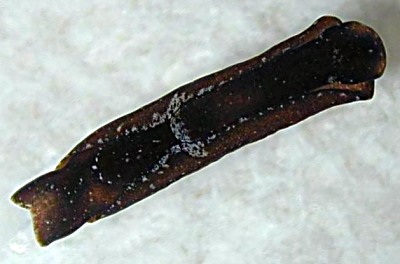
Aglaja felis
Marcus & Marcus, 1970
Order: CEPHALASPIDEA
Superfamily: PHILINOIDEA
Family: Aglajidae
DISTRIBUTION
Caribbean
PHOTO
Found over a range of 100 miles in the Exumas chain of islands, Southern Bahamas, Depth: 2 - 10 feet. [January - March, 2003]. Upper: 1/8 inch - 1 inch long. Lower: approx 1/4 inch. Photos: Anne DuPont.
Marcus & Marcus (1970) described this small aglajid from Puerto Rico. The living animals were 8-12mm long, and the colour was described from photos as 'velvet black all over, or dark reddish brown'. Thompson (1977) reports numerous 4-7mm long specimens of the black colour form from Jamaica. The headshield is 'a little or much larger than mantle shield' and 'the left posterior mantle lobe appears somewhat broader than the right one; no flagellum.' The only other record of this species is Thompson's (1977) from Jamaica. I assume they named the species felis because of Eveline Marcus' great love of cats.
The upper photo fits the original description of A. felis. The original description does not mention lighter specks on the body so it is possible the brownish speckled animal is a second species. I guess this is something that only more work will sort out
References:
• Marcus, Er. & Marcus, Ev. (1970) Opisthobranchs from Curacao and faunistically related regions. Uitqaven van der Natuurwetenschappelijke Studiekring voor Suriname en de Nederlandse Antillen, 59: 1-129.
• Thompson, T.E. (1977) Jamaican opisthobranch molluscs I. Journal of Molluscan Studies, 43(2): 93-139, pls.1-3.
Rudman, W.B., 2003 (April 13) Aglaja felis Marcus & Marcus, 1970. [In] Sea Slug Forum. Australian Museum, Sydney. Available from http://www.seaslugforum.net/find/aglafeli
Related messages
Aglaja felis from Bahamas
January 16, 2004
From: Anne DuPont
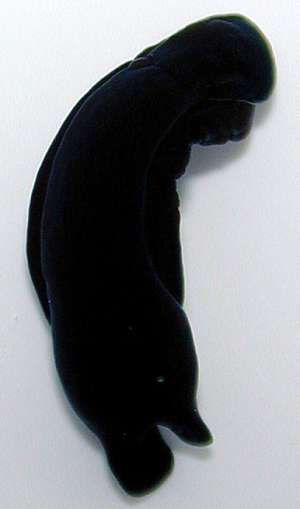
Dear Bill,
Bill, regarding my post: April 15, 2003 Aglaja felis from the Bahamas.
This winter I have been finding many more Aglaja felis than last winter, and much larger ones. In these better photos you can see the headshield and mantle shield much better and the broader left posterior mantle lobe.
Thank you again for your time and the wonderful Forum.
Cordially,
Anne DuPont
Delray Beach, Fl USA
akdupont@bellsouth.net
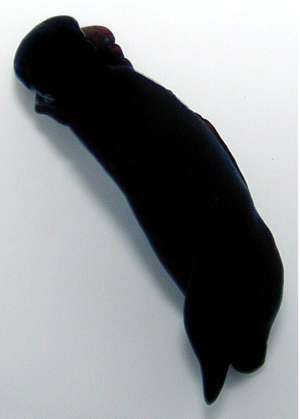
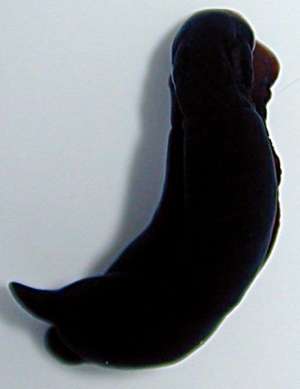
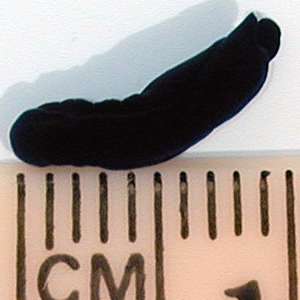
Thanks Anne,
Bill Rudman
Aglaja felis from the Bahamas
April 15, 2003
From: Anne DuPont


Bill,
Another little mystery....
I found these with the other aglajids [Chelidonura hirundinina, C. berolina, and Philinopsis depicta] over a range of 100 miles in the Exumas chain of islands, Southern Bahamas, in depths from 2 feet to 10 feet. [January - March, 2003].
The black ones were 1/8 inch to about 1 inch long. The brownish ones [lower photo] were a little "longer and skinny". The one in the photo was about 1/4 inch long and was photographed in a dish.
Anne
akdupont@bellsouth.net
DuPont, A., 2003 (Apr 15) Aglaja felis from the Bahamas. [Message in] Sea Slug Forum. Australian Museum, Sydney. Available from http://www.seaslugforum.net/find/9582Thanks Anne,
I am not sure these two are the same species - I guess only a detailed study of the populations will sort that out. Marcus & Marcus (1970) described another species from Puerto Rico which they called Aglaja felis. The living animals were 8-12mm long, and the colour is described from photos as 'velvet black all over, or dark reddish brown'. Thompson (1977) reports numerous 4-7mm long specimens of the black colour form from Jamaica.
The upper photo fits the original description of A. felis. The original description does not mention lighter specks on the body so it is possible the brownish speckled animal is a second species. I guess this is something that only more work will sort out
• Marcus, Er. & Marcus, Ev. (1970) Opisthobranchs from Curacao and faunistically related regions. Uitqaven van der Natuurwetenschappelijke Studiekring voor Suriname en de Nederlandse Antillen, 59: 1-129.
• Thompson, T.E. (1977) Jamaican opisthobranch molluscs I. Journal of Molluscan Studies, 43(2): 93-139, pls.1-3.
Best wishes,
Bill Rudman
